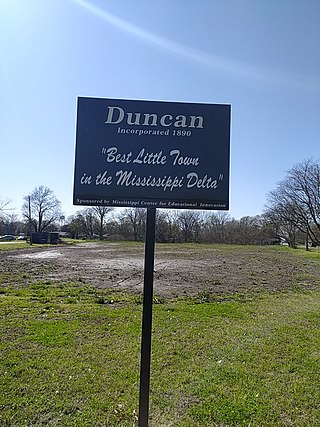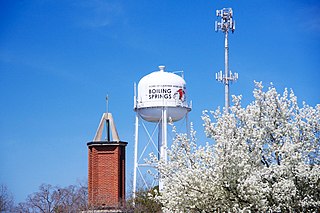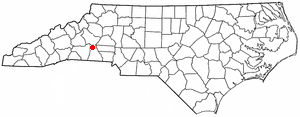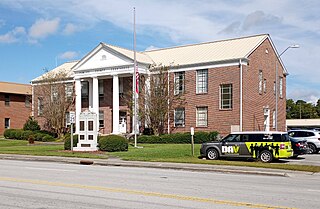
Cleveland County is a county located in the foothills of the Blue Ridge Mountains and the western Piedmont, on the southern border of the U.S. state of North Carolina. As of the 2020 census, the population was 99,519. Its county seat is Shelby. Cleveland County comprises the Shelby-Kings Mountain, NC Micropolitan Statistical Area, which is also included in the Charlotte-Concord, NC-SC Combined Statistical Area.

Morristown is a town in Hanover Township, Shelby County, in the U.S. state of Indiana. The population was 1,218 at the 2010 census.

Duncan is a town in Bolivar County, Mississippi, United States. Per the 2020 census, the population was 276.

Boiling Springs is a town in Cleveland County, North Carolina, United States and is located in the westernmost part of the Charlotte metropolitan area, located approximately 50 miles away from the city. As of the 2010 census, the town's population was 4,647. It is home to Gardner–Webb University. The town is named after the natural spring found on the university's property, which feeds a small lake.

Casar is a small town in northern Cleveland County, North Carolina, United States. The population was 297 at the 2010 census.

Earl is a town in Cleveland County, North Carolina, United States. The population was 260 at the 2010 census.

Fallston is a hamlet in Cleveland County, North Carolina, United States. The population was 607 at the 2010 census.

Grover is a town in Cleveland County, North Carolina, United States. The population was 708 at the 2010 census.

Kingstown is a town in Cleveland County, North Carolina, United States. The population was 681 at the 2010 census.

Lattimore is a town in Cleveland County, North Carolina, United States. The population was 488 at the 2010 census.

Lawndale is a town in Cleveland County, North Carolina, United States, situated along the First Broad River. The population was 606 at the 2010 census.
Light Oak is an unincorporated area and census-designated place (CDP) in Cleveland County, North Carolina, United States. The population was 691 at the 2010 census.

Mooresboro is a town in Cleveland County, North Carolina, United States. The population was 311 at the 2010 census.

Patterson Springs is a town in Cleveland County, North Carolina, United States. The population was 622 at the 2010 census.

Polkville is a small town in Cleveland County, North Carolina, United States. The population was 545 at the 2010 census.

Waco is a town in Cleveland County, North Carolina, United States. The population was 321 at the 2010 census.

Bayboro is a town in Pamlico County, North Carolina, United States. The population was 1,161 at the 2020 U.S. census. It is the county seat of Pamlico County.

Cleveland is a town in the Cleveland Township of Rowan County, North Carolina, United States. The population was 871 at the 2010 census.

Ronda is a town in Wilkes County, North Carolina, United States. The population was 417 at the 2010 census, and 413 at the 2020 census. Ronda was named after a nearby estate called "Roundabout", which was the residence of Benjamin Cleveland, a locally prominent planter and a colonel in the North Carolina militia during the Revolutionary War. The town is home to East Wilkes High School, one of Wilkes County's five public high schools.

Long View is a town in Burke and Catawba counties in the U.S. state of North Carolina. The population was 4,871 at the 2010 census. It is part of the Hickory–Lenoir–Morganton Metropolitan Statistical Area.


















